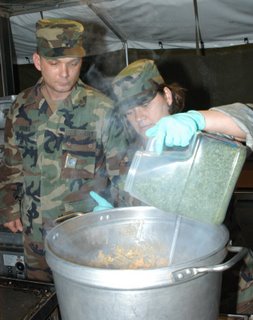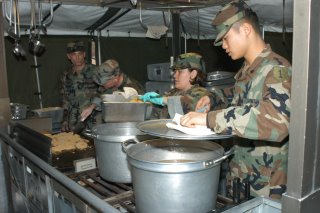I sometimes locate a military picture that puzzles me. This one is from the 30th Annual U.S. Army Culinary Arts Competition, held at Fort Lee, Virginia, in March 2005. An army culinary specialist from the Fort Riley, Kansas, team is adding dried parsley flakes to a 10-gallon pot of macaroni and cheese.
My issue isn't that the cook is adding dried parsley to the macaroni dish. This is an Army field cooking competition that tests the team's cooking skills using ingredients from the Army's field menu.
Rather, it's her technique. You don't tip a 1-gallon container of any spice or herb over the pot and expect to measure with any accuracy. Remember, accidents happen. And they're disastrous when competing for gold.
My issue isn't that the cook is adding dried parsley to the macaroni dish. This is an Army field cooking competition that tests the team's cooking skills using ingredients from the Army's field menu.
Rather, it's her technique. You don't tip a 1-gallon container of any spice or herb over the pot and expect to measure with any accuracy. Remember, accidents happen. And they're disastrous when competing for gold.
 |
| Sgt. Erica Vega, Fort Riley, Kan., adds parsley flakes to the macaroni pot. Sgt. Brian Brooks supervises the team to ensure a timely finish. (Photo by Sgt. Jorge Gomez, Fort Lee Public Affairs Office.) |
 |
| With less than 30 minutes left before deadline, the Fort Riley, Kan., team rushes to complete their menu of breaded pork chops, macaroni and green beans in a mobile kitchen trailer. (Photo by Sgt. Jorge Gomez, Fort Lee Public Affairs Office.) |
Here's an excerpt on the field competition from an Army.com article, published on March 15, 2006:
Chefs faced the pressure of preparing 50 meals in cramped space with very little room for error. Teams of four Soldiers marched into their mobile kitchen trailers and took inventory of equipment. With a mystery basket of ingredients featuring pork chops, the chefs sketched a plan of attack.
Mobile burner units lit up at 8:30 a.m., launching the competition into full-battle cooking.
Two senior food service judges from Fort Lee closely observed the teams throughout the morning. Like hawks, they watched the Soldiers butcher meats, knead dough, sauté onions and maintain sanitation procedures to meet the 11:30 a.m. deadline.
Designed to try the Soldiers in field cookery and teamwork, the event tested how the teams used their equipment, planned, prepared and served their meals. Points were awarded for sanitation, timing, techniques, presentation, nutrition and enhancement. Major points were awarded for flavor, taste, texture, temperature and doneness.Given limited resources, Soldiers tackled the challenge of coming up with a creative way to “sell” their product to the judges, said Chief Warrant Officer 4 Arnold Montiel, Basic Food Services Training Division chief and judge.
“This experience encourages the Soldiers to maximize the use of all their ingredients to better prepare meals when they are out in the field. It teaches them that there is always another way to prepare the same menu,” Montiel said.
“Anyone can make a pork chop,” said Command Sgt. Maj. Clinton Jackson, food service sergeant major at Fort Drum, N.Y.
“Creativity will be a key element in the competition, but the advantage may go to the teams who have more experience cooking in the field,” Jackson said.


No comments:
Post a Comment